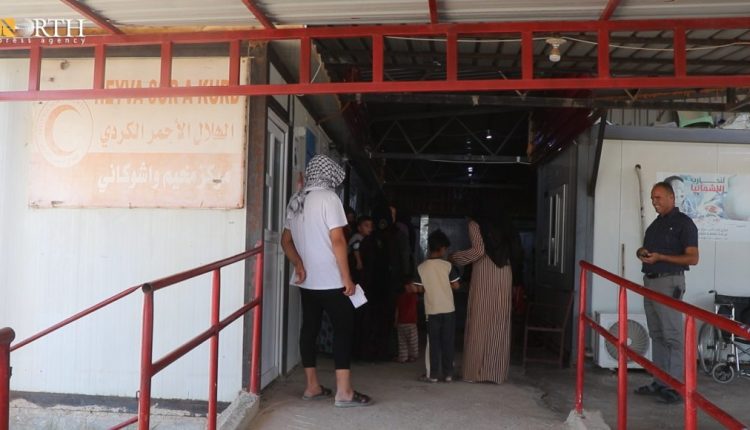
By Samer Yassin
HASAKAH, Syria (North Press) – At Washokani Camp, which houses displaced persons from Sere Kaniye (Ras al-Ain) in the northwestern countryside of Hasakah in northeast Syria, a critical shortage of medications has emerged following the withdrawal of support from the World Health Organization (WHO).
Sheikha al-Abd, a 36-year-old IDP residing in the camp, faces the challenge of finding essential medications for her mother, who suffers from diabetes, heart disease, and vision problems. To meet her mother’s medical needs, al-Abd devotes an entire day each week to scouring available resources.
She starts her search at the Kurdish Red Crescent (KRC) clinic within the camp and then extends her efforts to private pharmacies both inside and outside the camp until she secures all the required medications.
Washokani Camp, which shelters 2,377 displaced families comprising a total of 16,876 individuals, was established by the Autonomous Administration of North and East Syria (AANES) following the occupation of Sere Kaniye by Turkish forces and its affiliated armed opposition factions, aka the Syrian National Army (SNA), in late October 2019.
In the wake of the WHO’s cessation of support in early May, medical care and medication provision at the camp have been taken over by the Kurdish Red Crescent (KRC) and another non-governmental organization. Previously, WHO had played a crucial role by offering medical services and performing free surgeries for the camp’s residents.
Limited resources
Al-Abd expresses frustration over the severe shortage of essential medications at the KRC clinic, which are critical for managing her mother’s multiple health conditions, including diabetes and heart disease.
Faced with this scarcity, she often has to seek out and purchase most of the necessary medications from pharmacies outside the camp.
She reveals to North Press that the high cost of these medicines, coupled with their limited financial resources, forces them to sell relief items to afford the medication.
If the required medicines were consistently available at the clinic, she could have included the cost in their regular household budget, she notes.
Al-Abd says that she sometimes spends over 100,000 Syrian pounds (SYP approximately $6) for just two packets of medicine at private pharmacies, further straining their already tight budget.
Lack of critical medications
Abdul-Aziz Bakr, a 45-year-old IDP from the town of Tel Tamr in northwestern Hasakah, is deeply displeased by the lack of medications for chronic conditions at the camp’s clinic.
While basic flu medications and first aid supplies are reliably stocked, essential treatments for chronic illnesses are often missing.
Bakr explains that when the necessary medications are not available at the clinic, they are forced to purchase them from private pharmacies within the camp.
However, these pharmacies frequently run out of stock as well, leading Bakr to seek out private pharmacies outside the camp where prices are prohibitively high.
He emphasizes the financial strain this places on IDPs, noting that many are already struggling with the harsh realities of living in tents throughout the year.
The high costs of chronic disease medications exacerbate their difficulties, further stretching their limited resources.
Essentials
Majd Abdulkader, an officer at the KRC clinic in Washokani camp, explains that the clinic operates based on a core list of essential medications that are meant to be consistently available.
This list is designed to cover the most critical needs at the camp’s medical facilities.
Abdulkader notes that the list can be expanded only if specific requests are made for additional types of medicine, and if those medications are available in the KRC’s warehouses.
He assures North Press that first aid and emergency medications are reliably stocked at the KRC clinic. However, for certain hospital-specific medications, the clinic coordinates with hospitals in Hasakah to transfer patients and obtain the necessary treatments.
This arrangement ensures that patients requiring specialized care can access the medications they need through local hospital services.
